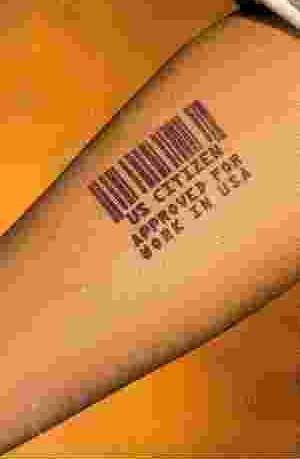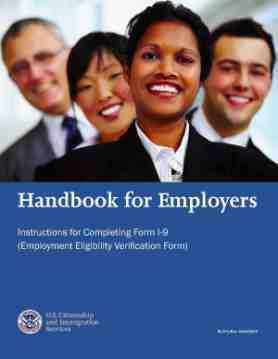|
I-9
Information You Can Use
|
Give
me your tired, your poor,
Your huddled masses yearning to breathe free. The wretched refuse of your teeming shore. Send these, the homeless, the tempest- tost to me I lift my lamp beside the golden door! |
 |
|
Not Responsible for Accuracy of Translation which is provided by a third party as a free service Who I am Services We Offer A History of Antidiscrimination Outreach Under the IRCA 1987-1991. Lawsuit says DHS deported a native born U.S. citizen who was disabled. Click here. Illustrates why it is important that any immigration reform bill be practical. Where to email your Congressional Representatives to let them know your views or seek their help in determining what's going on. Employer Sanctions Law and Department of Homeland Security Implementing Regulations Nondiscrimination law applicable to employer sanctions and implementing Department of Justice Regulations. Will a national ID card make things  easier? Read "Papers, Papers .
. . Please: A
National ID or an
Electronic Tattoo?"
easier? Read "Papers, Papers .
. . Please: A
National ID or an
Electronic Tattoo?" An Overview of the antidiscrimination provision applicable to employer sanctions "IRCA's ANTIDISCRIMINATION PROVISION - How It Works and Can It Be Used to Combat Anti-Immigrant Fears? Would the 2007 Immigration Bill, the "Grand Bargain", Have Solved Our Immigration Problems? Useful Links |
The most filled out Federal form other than the IRS 1040 Tax Form. We can help you do it correctly. Contact Andy Strojny at andy.strojny@yahoo.com and learn how Things you need to know. Do you know it is
against
the law to prefer U.S. Citizens for most jobs over
permanent residents
and other legal U.S. workers?
Do you know that there is a way for legal U.S. workers to challenge an employer who they believe prefers to hire unauthorized workers or H-1B visa holders for jobs to the exclusion of U.S. Citizens, Permanent Residents, and other legal U.S. workers? Do you know that the current I-9 Form is in violation of the Paperwork Reduction Act and what that means? Do you know how the E-Verify system can suggest employees are not work authorized when they are and what can be done about it? In
a
one
day
training
course,
I
can provide you with answers to these
questions and help ensure that the laws against
hiring unauthorized workers are fairly and effectively enforced. Keep reading for a preview of what is covered. good until August 31, 2012. Click here for a copy of the current I-9 form Click here for a copy in Spanish Note: Only usable in Puerto Rico Note: . The 02/02/09 edition of the I-9 Form can still be used. You can get the latest version of the Handbook for Employers revised July 31, 2009 by clicking here. E-Verify Findings of the Web Basic Pilot Evaluation have been released. Click here for a copy Click here to see the OSC Guidance for what should be done when an employer receives a "no-match" letter. District Court temporarily stops enforcement of the no-match rule set forth below. According to a story
on yahoo news:
A
federal judge has blocked a proposed rule
requiring employers to
fire workers whose names don't match their
Social Security numbers,
dealing a major blow to the Bush
administration's crackdown on illegal
immigration.
Under the rule, businesses with employees whose names and Social Security numbers didn't match would have three months to correct the mistakes or fire the employees. If not, they could face government prosecution. Businesses had argued that enforcing the rule would be expensive and expose them to legal action either from the government, if they didn't comply, or from any employees fired unfairly because of a mistake not corrected in time. U.S. District Judge Charles Breyer's temporary injunction, issued Wednesday, stopped the Department of Homeland Security proposal from going into effect, at least temporarily. Breyer said the proposal would likely impose hardships on businesses and their workers. Employers would incur new costs to comply with the regulation that the government hasn't evaluated, and innocent workers unable to correct mistakes in their records in time would lose their jobs, the judge wrote. * * *
* * This
is
the
rule
that
is
the
subject of Judge Breyer's order. It was
published August 15, 2007. The regulation
preamble says: The amended
regulation
describes the legal obligations of an
employer,
under current immigration law, when the employer receives a no-match letter from the Social Security Administration or receives a letter regarding employment verification forms from the Department of Homeland Security. It also describes ``safe-harbor'' procedures that the employer can follow in response to such a letter and thereby be certain that the Department of Homeland Security will not use the letter as any part of an allegation that the employer had constructive knowledge that the employee referred to in the letter was an alien not authorized to work in the United States. On
October
7, 2009, U.S. Immigration
and Customs Enforcement issued a final rule
stating:
The
Department
of
Homeland Security (DHS) is amending its
regulations
by rescinding the
amendments promulgated on August 15, 2007, and October 28, 2008, relating to procedures that employers may take to acquire a safe harbor from receipt of No-Match letters. DHS is amending its regulations as proposed on August 19, 2009, without change. Implementation of the 2007 final rule was preliminarily enjoined by the United States District Court for the Northern District of California on October 10, 2007. After further review, DHS has determined to focus its enforcement efforts relating to the employment of aliens not authorized to work in the United States on increased compliance through improved verification, including participation in E–Verify, ICE Mutual Agreement Between Government and Employers (IMAGE), and other programs. Existing Law
Provides a Remedy for U.S. Citizens Who Believe an
Employer
Preferred to Hire a Non U.S. Citizen Rather than a U.S. Citizen  The Office of Special Counsel for Immigration Related Unfair Employment Practices (OSC) Agrees. On May 1, 2008, OSC
assessed a $45,000
civil penalty against iGate Mastech to settle a
discrimination
allegations that it favored "H-1B visa holders to the
exclusion of U.S.
citizens, lawful permanent residents, and other legal
U.S. workers."
OSC maintained that preferring H-1B visa
holders over legal U.S.
workers constituted citizenship status discrimination
and is prohibited
by the Immigration and Nationality Act.
 If you would like a USCIS "Handbook for Employers Instructions for Completing Form I-9 (Employment Eligibility Verification Form)" (M-274 - Rev. 07/31/09) E-mail: and we will E-mail you
one You may also obtain a The I-9 Handbook for Employers contains I-9 forms. However, if you would like to download I-9 (also called I9) Forms alone (without the Handbook for Employers), go to the I-9 download page at the U.S. Citizenship and Immigration Services Website and follow the instructions posted there. Are you doing right?  Take
the I-9 Quiz,
and find
out. Take
the I-9 Quiz,
and find
out. Click here  Well how did you do? Perhaps you'd like some training? Click here FREQUENTLY ASKED
QUESTIONS? Of Special Interest
It states:
Q
- If an
employer believes a new
hire
is an alien, can s/he ask the person to produce
a Green
Card when
filling
out
the
I-9
Form?
Q
- Why must United
States citizens fill out
I-9
forms?
Q - When filling out the I-9 Form, can an employer accept documents that establish identity (a list B document) and work authorization (a list C document) for an employee with one document in her maiden i.e, single, married or divorced name, and one document in a different name, e.g. her married, single or divorced name? (Now with input from the Office of Special Counsel for Immigration Related Unfair Employment Practices.) Q - Can an employer advertise for jobs stating "US citizens only", "US passport required" or some other requirement that indicates the job is only open to U.S. citizens?
If
you have other questions you would like answers
to, E-mail us at ANDY.STROJNY@YAHOO.COM.
If an employer is charged with violating the Immigration and Nationality Act's (INA) nondiscrimination or employer sanctions provisions, the employer has a right to an administrative hearing. The case decisions issued by the administrative hearing examiner after an administrative hearing are a matter of public record. You
can discover if any administrative hearing case
decision has dealt with
situations you are interested in by going to the
To
discover how to find case decisions dealing with
specific subject areas, - now with links to referenced Administrative Hearing Decisions - Find
Out
(NOW WITH LINKS TO THE REFERENCED ADMINISTRATIVE HEARING DECISIONS) Copyright (c) 1999 by the American Immigration Lawyers AssociationReprinted with Permission of: 1998-99 Immigration & Nationality Law Handbook Volume II Advanced Practice Some
argue
that making all citizens
and
immigrants carry papers
Papers,
Papers
. . . Please: A National ID or an |
We are committed to helping Employees and the General Public know their rights and Employers know their responsibilities under the laws governing Employer Sanctions.
As interest warrants, we will be posting additional information about the I-9 process, DHS Employer Sanctions provisions, and the protections against citizenship status discrimination.


